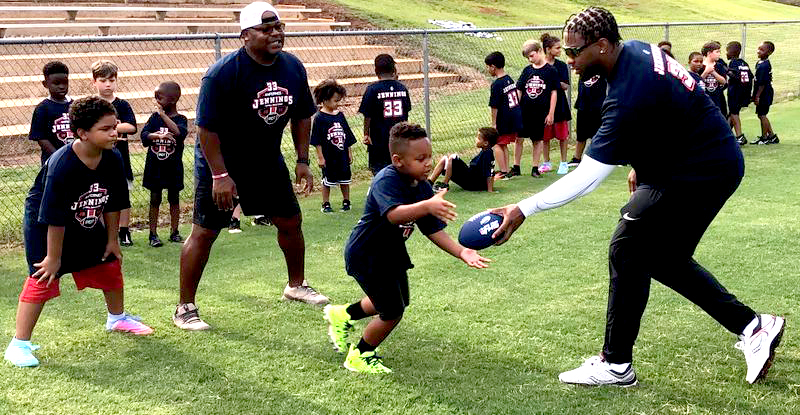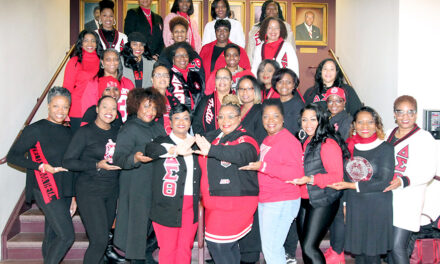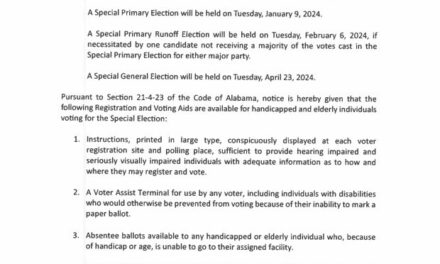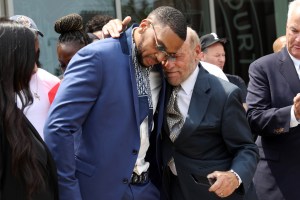There is toughness and there is strength and they are not the same things.
Uncommon toughness allowed New England Patriots linebacker Anfernee Jennings to thrive on Nick Saban’s practice field and become a starter for Alabama. Toughness brought him back from an injury that almost cost him his leg. Toughness allows him to manage the savagery of pro football. It is strength, though, that has put him in a position to wrap his arms around his community following the mass shooting in Dadeville.
Jennings was back in Dadeville this past Friday for his annual all-ages football camp. It was free for campers. Jennings paid for everything, and the production was first class. A DJ was flown in from San Diego to provide a soundtrack for the event. Other personnel for the camp came from Philadelphia and West Palm Beach, Fla. The coaches were former college players.
It felt like an authentic NFL experience down to the new brand of sports drinks all the teams are using these days. It’s called DripDrop and the kids loved it. Close to 200 children participated in the camp and everyone left with a T-shirt and at least one hand-off or pass from Jennings. He played quarterback throughout the afternoon as campers rotated through different stations.
“It means a lot coming from a place so small,” Jennings said. “I’m probably kin to half of the kids out here.”
Jennings is from Jackson’s Gap, Alabama. It’s a tiny lakeside hamlet in Tallapoosa County about five minutes outside of Dadeville. Jackson’s Gap and Dadeville are small Alabama towns with big hearts. You won’t find better people anywhere. I showed up uninvited on Friday afternoon and within five minutes someone gave this unprepared reporter from the city their umbrella in the rain.
Some people from Alabama are country strong. I have the strength to admit that I am not among them.
I am better for them, though, and my heart ached for Dadeville in April when four young people were killed at a Sweet 16 birthday party. They were Shaunkivia Nicole Smith, 17, Marsiah Emmanuel Collins, 19, Corbin Dahmontrey Holston, 23, and Philstavious Dowdell, 18. Twenty-five others were shot and even more were injured during that hellish scene of guns and blood.
No one gets over that kind of trauma and the most painful scars are the ones people don’t see.
Firearms are now the leading cause of death among children in the United States. Our gun culture is an epidemic. Imagine all those scars. Police found shell casings for seven different guns at the scene of Dadeville’s nightmare. Young people just started shooting each other. That’s our country, and even in places like love-rich Tallapoosa County, Alabama.
Who has any answers for such needless death? Doctors? Teachers? Ministers of the faith? Politicians? Maybe athletes. Maybe the toughest among us can teach us about true strength. I don’t know anyone tougher than Jennings. He once tried to shrug off severe arterial damage in his leg following a freak injury at Alabama. I asked Jennings his thoughts about guns and kids. What he said made a lot of sense.
“That’s the culture we’re growing up in, unfortunately,” Jennings said. “It’s a lot of influential people who preach about guns. Not to say I’m anti-gun or anything like that, but I believe there is a safe way and more of a responsible way of having weapons and using them — and not flashing them, and stuff like that.
“I just hope that we can get a better grip on how to be responsible with guns and what we do with them because they’re really not nothing to play with.”
College and pro athletes are role models, for good or ill. That’s why Ja Morant of the Memphis Grizzlies will begin the NBA season serving a suspension for flashing a gun on social media. I asked Jennings about athletes being role models and he cut me off.
“It’s even deeper than that,” he said. “Where I come from, it’s a place where a lot of us grew up without our fathers. We had good surroundings, so we could see the right way to do things — just trying to always be that role model at an early age to do stuff right.
“My mom, she preached and stayed on us about doing the right thing, and staying on top of us in school. Once I got out of high school and realized what I could potentially be or do, I just always tried to stay on the straight and narrow, and it paid off for me. I’ve been able to do a lot of things and I’ve had a lot of opportunities because I made good decisions. I didn’t get in a lot of trouble, so I try to encourage that to the younger kids.”
Jennings was always one of my favorite players because I knew how hard he worked to make a name for himself at Alabama. After what he shared during our interview, I have new admiration for someone who has grown into a community leader. Jennings remembers when he was a football camper. He remembers looking up to college and pro players. We always talk about the negative social cycle that leads to violent crime. Jennings is a reflection of the positive cycle that athletics can have on a community.
Here’s what he tells children these days: “Do what the teachers and the people giving you structure are telling you to do, first of all. And work hard and make the most of every opportunity. I feel like I was a guy who made the most of all my opportunities. That paid off a lot for me, so doing that and always being ready and staying ready helped me out in the long run.”
We are all connected. I tell young reporters and writers that all the time. That’s why storytelling matters and why journalism is so important. Spend a day at a football camp. Ask people about the power of community. They will have stories that relate to everyone.
Jennings missed training camp for the Patriots in the days after the Dadeville shooting. He visited the families of the victims. He brought them flowers and hugs. He tried his best to bring them strength.
“That was hard,” Jennings said. “That was probably one of the hardest things I’ve ever had to do. But, you know, I feel like that was the least I could do. I probably didn’t help them out a lot, but at the time, me being able to do that … maybe helped them out a little bit.”
Jennings had a personal relationship with Phil Dowdell, the 18-year-old who was killed in the shooting. Dowdell was a good football player and he wasn’t afraid to ask Jennings for advice. He listened, too. Dowdell was an eager learner and he was making plans to play for Jacksonville State and coach Rich Rodriguez.
“Me and Phil had kind of a unique relationship,” Jennings said. “He would ask me questions and his eyes were so big that you knew he was going to do great things. He had the passion for it and he put in the work to do it.
“So, like, for it to go like it went, and him get stripped of that opportunity, that breaks your heart. … Ain’t much to say about that.”
After having the strength to share that memory, there really ain’t much left to say.
Jennings honored Dowdell at the football camp. Every T-shirt featured his initials and football number. “PD7″ could have been a coach at the camp this year. It was his time to give back, and I would like to think that the memory of eager-learning Dowdell will inspire campers in Dadeville for years to come.
It’s easy to meet people in Dadeville. They’re happy to talk to strangers like me. Ebonique Nelms was watching her young son enjoy the football camp when I sat down next to her and started talking about things no one in Dadeville can ever forget. Nelms is from nearby Camp Hill. She knows the Dowdell family, too.
“I was there that night,” she said.
She meant that she went to the scene of the shooting after it happened. She saw the destruction that gun violence brought to her community. In the few months since it happened, Nelms believes that Dadeville has rallied around itself. “Unity,” she said, and Nelms looked out at the campers running through their drills. Like she was imagining something from her past while looking ahead to the future.
“One day these little kids out here will be coaching,” Nelms said.
Dadeville wants people to know that the shooting is not going to define their community. There’s no way that it could. These people are too strong.











